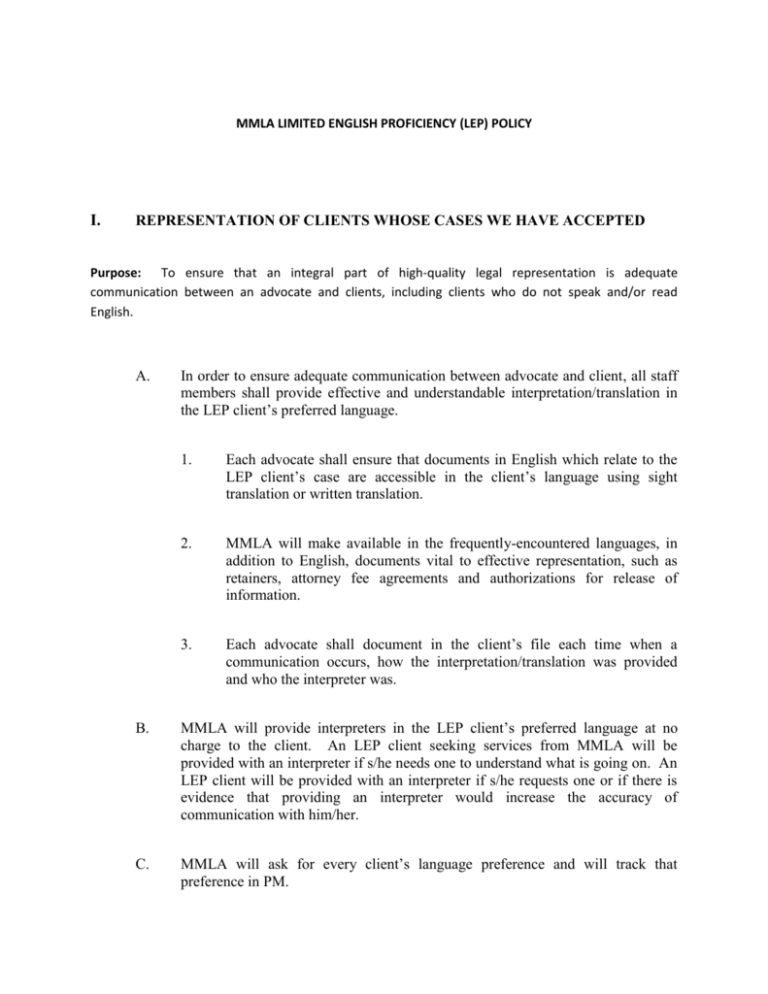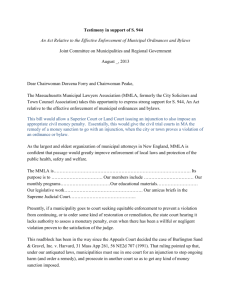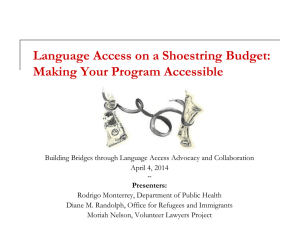MMLA LIMITED ENGLISH PROFICIENCY (LEP) POLICY
advertisement

MMLA LIMITED ENGLISH PROFICIENCY (LEP) POLICY I. REPRESENTATION OF CLIENTS WHOSE CASES WE HAVE ACCEPTED Purpose: To ensure that an integral part of high-quality legal representation is adequate communication between an advocate and clients, including clients who do not speak and/or read English. A. In order to ensure adequate communication between advocate and client, all staff members shall provide effective and understandable interpretation/translation in the LEP client’s preferred language. 1. Each advocate shall ensure that documents in English which relate to the LEP client’s case are accessible in the client’s language using sight translation or written translation. 2. MMLA will make available in the frequently-encountered languages, in addition to English, documents vital to effective representation, such as retainers, attorney fee agreements and authorizations for release of information. 3. Each advocate shall document in the client’s file each time when a communication occurs, how the interpretation/translation was provided and who the interpreter was. B. MMLA will provide interpreters in the LEP client’s preferred language at no charge to the client. An LEP client seeking services from MMLA will be provided with an interpreter if s/he needs one to understand what is going on. An LEP client will be provided with an interpreter if s/he requests one or if there is evidence that providing an interpreter would increase the accuracy of communication with him/her. C. MMLA will ask for every client’s language preference and will track that preference in PM. II. III. D. MMLA will provide both verbal offers and/or written notices to LEP clients in their preferred language informing them of their right to receive interpretation/translation in matters related to MMLA representation. E. MMLA will assure the competence of language assistance provided to LEP clients by interpreters and bilingual staff. Family and friends should not be used to provide interpretation services, except upon request by a client. Minor children shall not be used to interpret for LEP clients. If a client presses for use of family or friends, MMLA should make some judgment about the person’s translation accuracy, particularly with complex legal terms, should understand any relationships the requested interpreter has with the client which may present conflicts, and should ascertain whether the would-be interpreter has an interest in the outcome of the matter. If in the advocate’s judgment a professional interpreter is needed, the advocate shall use one. Since some entities preclude family members and others from interpreting, an advocate should be aware of and comply with any specific requirements of the agency before which the advocate and client will appear. INTAKE A. MMLA will post signs in the reception rooms of its offices in the commonlyencountered languages in the service area stating MMLA’s willingness to provide interpreters at no cost to limited English proficiency clients. B. MMLA will offer and provide access to interpreters at no cost to limited English proficiency (LEP) persons requesting services from MMLA offices during the hours the office is open for intake. C. MMLA recognizes that the cost of providing legal services to LEP persons is a cost of doing business and will budget accordingly. COMMUNITY EDUCATION MATERIALS A. In order to carry out a community education plan, MMLA will identify “vital” documents among the community education materials which shall be translated. B. MMLA will make available easily understood vital documents in commonlyencountered languages in addition to English. IV. STAFFING AND STAFF TRAINING FOR ADEQUATE LANGUAGE ACCESS A. B. C. MMLA will ensure that LEP clients receive effective and understandable communication. 1. As a first preference, bilingual staff should communicate directly with LEP clients. Whether to use staff to interpret will turn on the complexity of the legal issues or facts being communicated. An advocate shall err on the side of ensuring language proficiency. For example, an advocate should not seek to save money by using staff who are not certified to interpret, but should use a staff member who has been tested as qualified through MMLA’s contract testing company. Only in rare situations will MMLA ask a bilingual attorney to serve as an interpreter or translator in another advocate’s case. When such staff members are not available, face-to-face interpretation provided by contract interpreters is the next preference. 2. MMLA shall develop procedures for hiring interpreters which can be used by each office. 3. Telephone interpreter services should be used as a supplemental system when an interpreter is needed quickly or when services are needed in an infrequently encountered language. MMLA shall ensure that all staff at all levels receive ongoing education and training in culturally and linguistically appropriate service delivery. 1. All staff with client contact shall receive training on best practices for working with LEP clients and working with interpreters. 2. All staff who will participate in court or administrative hearings shall receive training on best practices for interpreting in the legal context, including the Minnesota Rules of Professional Conduct and the Code of Professional Responsibilities for Interpreters in the Minnesota State Court System. MMLA encourages the hiring of bilingual staff who reflect the languages spoken in the service area. V. 1. MMLA will implement strategies to recruit, retain and promote at all levels of MMLA a diverse staff and leadership who are representative of the languages spoken in the service area. 2. MMLA will measure a bilingual staff member’s language competency through a testing process, paid for by MMLA. Bilingual staff who meet the standards in the language/salary policy will receive a salary increase. 3. MMLA encourages bilingual staff who will be interpreting in court or administrative hearings to go through the Supreme Court’s interpreter training. MMLA will pay for the expenses. 4. MMLA encourages bilingual attorneys to focus their language skills on direct representation of LEP clients who speak their language. Only in rare situations will MMLA ask a bilingual attorney to serve as an interpreter or translator in another advocate’s case. MAINTENANCE OF LEP ACCESS A. The Management Committee working with the Diversity/Inclusion Committee shall design a biennial organizational assessment of LEP-related services which shall include the following: 1. A system to measure whether an office is in compliance with MMLA LEP Policy. 2. A system for LEP clients to voice their concerns and complaints with MMLA’s delivery of language services. 3. A system to make MMLA’s LEP policy available to the public. B. MMLA will maintain a current language profile of the client communities in the service area. C. MMLA shall ensure that the grievance procedure is capable of identifying and resolving cross-cultural conflicts or complaints by LEP clients. The grievance procedure shall be translated in other languages.









